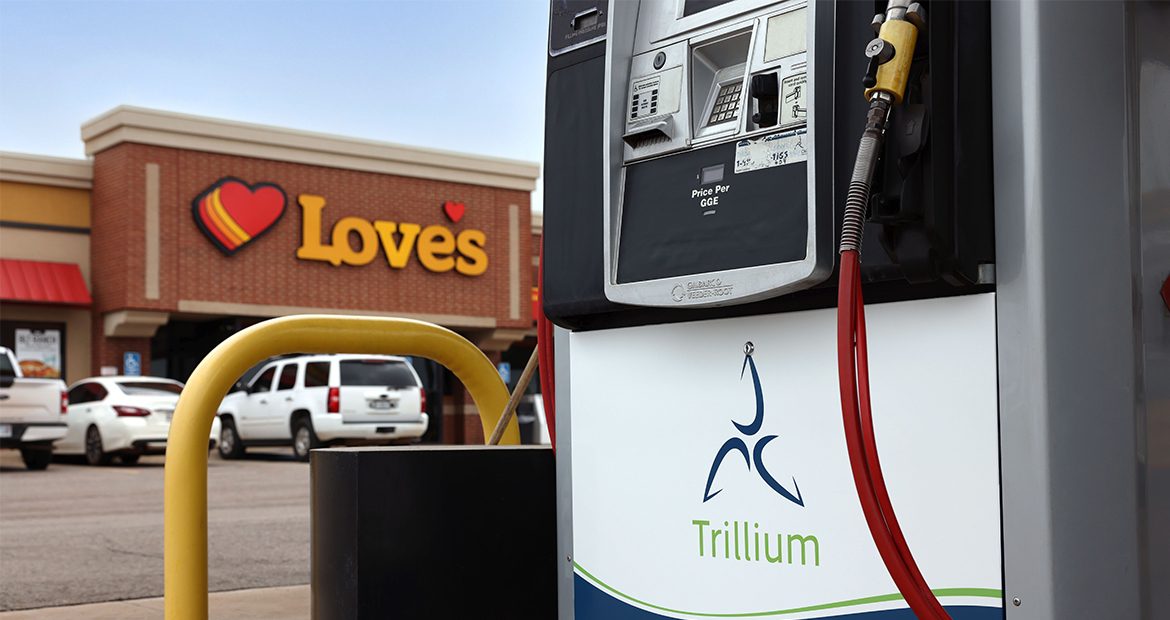A fundamental shift to clean vehicles and fuel is already well underway and natural gas vehicles (NGVs) are uniquely positioned to replace baseline diesel fleet operations easily and cost-effectively. Several factors are aligning to make NGVs an obvious choice for fleets motivated to maintain cost effectiveness while making immediate progress towards both their and their customers’ sustainability goals. The clear cost advantage of fueling with compressed natural gas (CNG) as compared to diesel, the availability of a new lighter and more powerful natural gas engine, and the growing national availability of renewable natural gas (RNG) set the stage for a clean fleet revolution powered by NGVs.
With on-road diesel prices still at a historic high, CNG continues to maintain a clear cost advantage, as well as greater price stability, compared to diesel. On average, the pump price for CNG in 2021 was $2.32 per diesel gallon equivalent (DGE) for private fuelers and $2.57 per DGE at public fueling stations, with diesel fuel averaging 25% higher on a DGE basis. In 2022, the national average price of diesel increased to more than $5.00 per gallon, meaning that fueling with CNG provides fleets with more than 50% fuel cost savings. This favorable price spread between natural gas and diesel creates opportunities for fleets to significantly reduce fuel and operating costs by fueling with CNG. Fleets that have embraced CNG are realizing clear economic benefits, particularly as diesel vehicles can be increasingly expensive to operate and maintain.
According to this year’s State of Sustainable Fleets report, an annual market and trends brief that provides insight into the significant developments in the clean fleet industry across vehicles and technologies, 79% of fleets surveyed report fuel cost savings as a primary advantage of operating NGVs compared to baseline diesel, with some fleets claiming a return on investment (ROI) in as little as two to three years. Natural gas vehicles provide a cost-competitive means for fleets to replace diesel trucks while achieving significant emissions reductions. In this nationwide fleet survey, 96% of fleets that have piloted or purchased NGVs in the past two years realized emission benefits and 89% saw fuel cost savings as compared to diesel.
The market for natural gas vehicles continues to develop with 70 medium- and heavy-duty models available from vehicle manufacturers covering a spectrum of medium- and heavy-duty vehicle types. Due to competitive and stable fuel prices and excellent performance in the right applications, leading fleets with existing natural gas truck programs continue to see significant fuel cost savings over diesel and report high satisfaction rates across critical sustainability, economic, and operational metrics. The report also found that because of the maturity of the NGV market, the total cost of ownership (TCO) and ROI are positive even when vehicle incentive funding is no longer available.
Just last year, leading engine manufacturer, Cummins announced plans to produce a new 15-liter natural gas engine for model year 2024 that has already received interest from major fleets. The lighter and more powerful engine will allow fleets that operate in traditional over-the-road long-haul and heavy-haul applications to be able to take better advantage of the operational, environmental, and cost performance benefits offered by natural gas.
The pairing of this engine with carbon-negative renewable natural gas (RNG) will enable a wider spectrum of fleets than ever before to immediately and cost-effectively achieve not only net-zero carbon operations, but carbon negative emissions. When RNG is used to fuel vehicles, it can provide major reductions in GHG emissions—in addition to clean air benefits provided by near-zero emission natural gas engines.
RNG is a renewable fuel produced by capturing and cleaning methane when it is emitted from the decomposition of organic waste, such as waste created from wastewater treatment plants, dairy operations, and landfills. It is also produced from the sustainable management of agricultural and forest waste. Depending on the source (or “feedstock”), RNG can have a negative carbon intensity or “CI” value. This is a way to measure the total carbon emissions a fuel produces at every stage, from its production to its consumption.
RNG production capacity increased in the United States by 24% from 2020 to 2021, enabling the production of enough RNG fuel to displace nearly 574 million gallons of diesel annually. RNG is a cost-effective and clean-burning alternative fuel that can be used as a seamless drop-in replacement for conventional natural gas. RNG is processed so it is pipeline-quality and completely interchangeable with traditional natural gas and can be delivered by the nation’s extensive existing pipeline infrastructure.
Trillium is a leading provider of renewable fuels and alternative and innovative energy solutions for fleets and offers RNG and CNG at both public and private onsite fueling stations nationwide. Trillium provides fleet operators from coast to coast with RNG and currently dispenses natural gas fuel, including RNG, at more than 200 facilities in 26 states with more than 65 public-access stations. RNG availability is increasing as Trillium continues to rapidly expand its fueling network and clean-fleet solutions throughout the United States.
To help customers leverage alternative fuel and zero emission technologies, Trillium and Cummins recently formed a partnership to assist customers who want to integrate alternative fuel technologies into their fleets by providing the resources, technology and infrastructure needed to save fleets time and money. With Trillium’s clean fueling options and Cummins’ powertrain expertise, they are aligned to help fleets meet their ESG goals.



